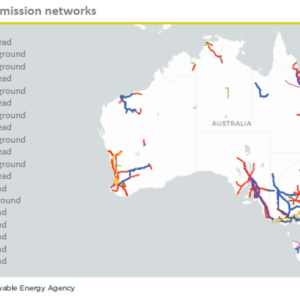Australia is a major agricultural producer and exporter. Agricultural production covers 55% of the nation’s landmass (427 million hectares in 2020) and accounts for 24% of water extractions (2,746 gigalitres in 2019-2020). In total 12% of Australia’s goods and services exports were agricultural related and the sector as a whole account for 2.5% of national...
Category: Australia News Brief and Action Alert
Australia: A Climate Look Past and Forward
Looking Back 2022: Elections Result in a Pro-Science Government / Looking Forward 2023: Hopeful Cancellation of Proposed Fossil Fuel ProjectsIn 2022 Australians took the opportunity to vote in a new Federal government that expressed belief in climate science and a commitment to legislate emissions reduction targets. After almost a decade of entrenched climate denial by...
Australia Power Grid Systems
The National Electricity Market, Northwest Interconnected System, and the South West Interconnected System Australia has three separate power grid systems. The largest of these is the electricity grid on the east coast, which supplies and distributes electricity to Queensland (Qld), New South Wales (NSW), the Australia Capital Territory (ACT), Victoria (Vic), South Australia (SQ) and...
Australia’s Greenhouse Gas Emissions Reporting
Australia’s primary database for tracking greenhouse gas emissions is the Greenhouse Gas Inventory (GGI), managed by the Australian Government Department of Industry, Science, Energy, and Resources (now renamed as Department of Climate Change, Energy, the Environment and Water (DCCEEW)). The data is released on a quarterly basis and provides the most up-to-date information on Australia’s...
Australia has High Passenger Car Ownership and No Mandatory Fuel Standards
While the 2022 Australian federal election signaled a positive change in the way the country is responding to climate change, the country’s love affair with vehicles seems unlikely to end anytime soon. Australia has high rates of vehicle ownership, with the 2021 Australian census demonstrating that by 31st January 2021 the country had 20.1 million...
Climate Change is a Central Concern for Australia’s Financial Stability
This post examines the loss and damage that climate change is expected to have on Australia between now and 2050. Assessments of climate change loss and damage are a key aspect of the Paris Agreement’s ongoing UNFCCC-sponsored Global Stocktake, an effort to assess the ability of the Paris Agreement to meet its goals. Loss and...
Results of Federal Election in Australia Bode Well for Climate Action
Australia has endured a series of devastating climate events over the past three years. The horrific bushfires of 2019-2020 captured global attention and an outpouring of donations to wildlife rescue and other conservation charities, while the continuous flooding of urban areas in northern New South Wales in early 2022 has led to billions in damages...
Australia: Climate Progress Indicators
Quarterly data on energy use, agriculture, land use, industrial processes, and more available from the National Greenhouse Gas Inventory In Post 49, three indicators for assessing Australia’s progress towards its climate emissions goals were identified: Greenhouse gas emissions by Australian Corporations (annual), full carbon accounting model (annual) and electricity generation by fossil fuels (annual)....
Young Australians Want More Action On Climate Change and Natural Hazard Risk Preparation
In February 2020 the Australian Institute for Disaster Relief joined with World Vision to complete the largest ever Australian youth survey on climate change and disaster risk: “Our World, Our Say” (see below). Age and gender of participants in the ‘Our World, Our Say’ survey of Australian youth in February 2020 (Source).More than 80% of...
Australian Government Prioritizes Natural Gas Production While Certain States and Territories Seek to Decrease Usage
Australia is party to the Paris Agreement, under which, it had pledged to achieve net zero emissions by 2050. However, Australia’s economy is heavily reliant on the fossil fuel industry – the major contributor to greenhouse gas (GHG) emissions.In 2020, Australia was ranked as the world’s 7th highest natural gas producer, with an annual production...











